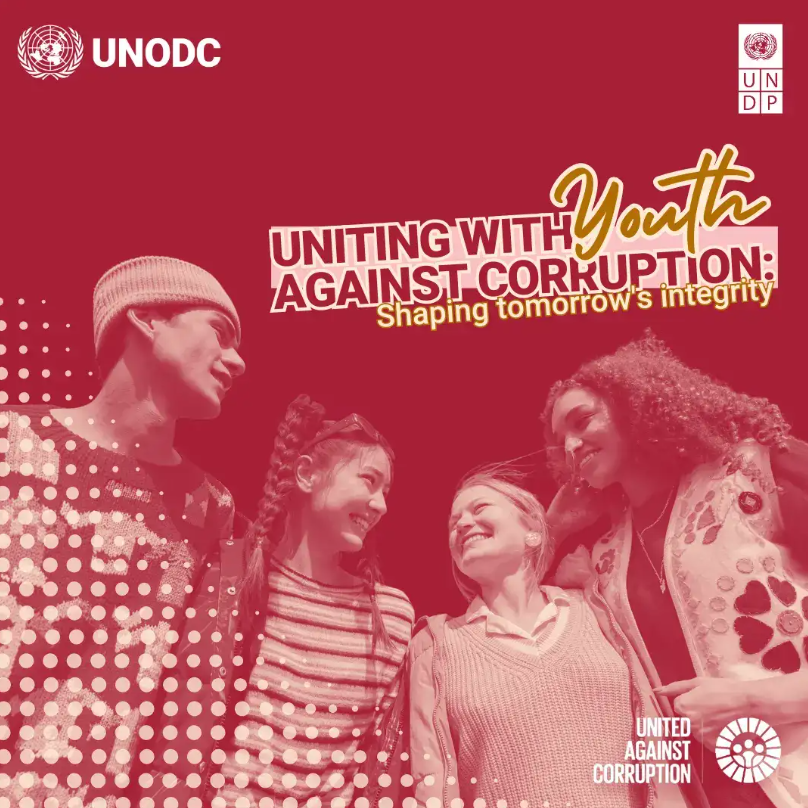International Anti-Corruption Day 2024
A message from UN Global Compact CEO & Executive Director Sanda Ojiambo onInternational Anti-Corruption Day, 9 December 2024
9 December is International Anti-Corruption Day. At the UN Global Compact, we support and amplify the campaign developed by the UN Office on Drugs and Crime (UNODC), the "guardian" of the UN Convention against Corruption (UNCAC) and of the Principle Ten of the UN Global Compact. The theme for 2024-2025, "Uniting with Youth Against Corruption: Shaping Tomorrow's Integrity" highlights the vital role young people play in promoting integrity and combating corruption.

This campaign emphasizes the need for youth to actively engage in discussions, share experiences and propose innovative solutions. By amplifying the voices of tomorrow's integrity leaders, we aim to inspire Collective Action and tangible change.
To achieve this, at the UN Global Compact, we have actively integrated youth participation into our key initiatives and celebrated their contributions through notable achievements.
During the 20th Anniversary of Principle Ten, young leaders shaped strategies and influenced dialogues against corruption. They continue to be instrumental at our Private Sector Forum panels, offering innovative perspectives. Among these inspiring voices was Ms. Ivanna Alvarado, UNODC Youth Ethics Ambassador, Bayer Mexico, who stated ‘’Corruption should no longer be viewed through the lens of 20 years ago. In the digital age, we must evolve the fight, harnessing emerging technologies and fostering a global culture of integrity. Young people, with our fresh perspectives, are not just recipients of change-- they are the innovators, driving bold solutions and reshaping our values to build a future free from corruption and full of opportunity for all"
At the country level, for example, as part of the Siemens Integrity Initiative, Global Compact Network Bangladesh engaged with over 500 youth leaders through its Youth for Integrity campaign. This initiative offered workshops and debate competitions focused on ethics, integrity, and good governance.
The role of the private sector in driving business integrity
The private sector has a pivotal role in fighting corruption, and we see three key areas of transformation:
1. Setting the global business integrity agenda
In 2023, the UN Global Compact co-hosted the first-ever Private Sector Forum at the UN Anti-Corruption Conference (CoSP), in partnership with the UNODC. During the conference, the UN Global Compact presented a Call-to-Action from Business—signed by 500 companies from 91 countries—urging Governments to intensify and reward anti-corruption efforts. Governments stepped up to the challenge, with 190 countries committing to adopt incentives for business integrity.
2. Driving Collective Action against corruption worldwide
Collective Action has become the norm for tackling corruption worldwide. More than half of the UN Global Compact Country Networks are seeking assistance to engage in anti-corruption Collective Action, a number that has tripled with support from the Siemens Integrity Initiative over the last decade. Collective Action enables corruption to be fought by various interest groups working together and building an alliance so that the problem can be approached and resolved from multiple angles. The ultimate aim of these joint efforts is to create fair and equal market conditions—a level playing field—for all market players and to eliminate the temptations of corruption for all of them.
3. Leading the evolution from compliance to integrity and beyond
Companies are now working beyond traditional corporate governance or mere compliance with legal requirements, toward acting as responsible corporate citizens looking to positively affect the ecosystem where they operate. To that end, the UN Global Compact created the transformational governance approach, which requires companies not only to be accountable, ethical and transparent but also to address the impact they have on societies and the environment. It goes further by encouraging contributions to justice, peace, and strong institutions, in line with SDG 16. It is no longer just about individually avoiding and mitigating the risks, pitfalls, and likely costs of corruption—such as legal or financial—but, above all, about seizing the opportunities and associated benefits of a robust culture of integrity that is fostered and implemented collectively.
To learn more about Anti-Corruption at the UN Global Compact, please see our Anti-Corruption Overview and information on our current Anti-Corruption Collective Action initiatives. For information on this year’s theme for International Anti-Corruption Day, please see UNODC page .
